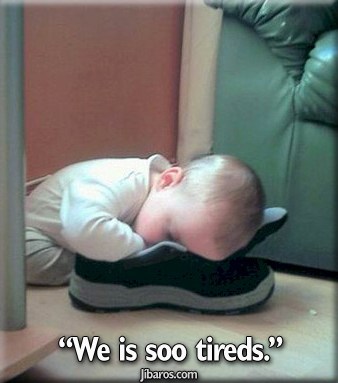
Today is...
 Why
Are We So Tired? Why
Are We So Tired?
Research by Don Jibaro
tired (tīr'd) adj. — in need of sleep or rest; weary. FATIGUED, exhausted,
worn out, weary, fatigued, dog-tired, dead beat, bone-tired,
ready to drop, drained, zonked, wasted, enervated, jaded;
Have you ever noticed that you are just so tired and do not
know why? Medical Fatigue is not tiredness caused by running
a mile or two. Fatigue (exhaustion, tiredness, lethargy,
etc.) is a subjective feeling of tiredness which is distinct
from weakness, and has a gradual onset. Unlike weakness,
fatigue can be alleviated by periods of rest.
Physical fatigue is the inability of a muscle to maintain
optimal physical performance, and is made more severe by
intense physical exercise. Mental fatigue is a transient
decrease in maximal cognitive performance resulting from
prolonged periods of cognitive activity, in other words, A
LOT of UNNECESSARY THINKING. It can manifest as somnolence,
lethargy, or directed attention fatigue and system collapse.
Medically, fatigue is a non-specific symptom, which means
that it has many possible causes. Fatigue is considered a
symptom, rather than a sign because it is a subjective
feeling reported by the patient, rather than an objective
one that can be observed by others. Fatigue and ‘feelings of
fatigue’ are often confused.
Physical fatigue, or muscle fatigue, is the temporary
physical inability of a muscle to perform optimally. The
onset of muscle fatigue during physical activity is gradual,
and depends upon an individual's level of physical fitness,
and also upon other factors, such as sleep deprivation and
overall health. It can be reversed by rest. Physical fatigue
can be caused by a lack of energy in the muscle, by a
decrease of the efficiency of the neuromuscular junction or
by a reduction of the drive originating from the central
nervous system.
The central component of fatigue is triggered by an increase
of the level of serotonin (stimulant) in the central nervous
system. During motion activity, serotonin promotes muscle
contraction. During high level of motor activity, the amount
of serotonin released increases and a spillover occurs.
Serotonin triggers nerve impulse initiation and thereby
muscle contraction are limited.
Mental fatigue is a temporary inability to keep mental
cognitive performance. This is gradual, and depends upon an
individual's learning ability, and also sleep deprivation
and overall health. Mental fatigue has also been shown to
decrease physical performance. It can manifest as lack of
sleep, lethargy, or directed attention fatigue and decreased
level of consciousness.
Stress, in
contrast, is a normal physical response to events that make you feel
threatened or upset your balance in some way. When you sense danger—whether
it’s real or imagined—the body's defenses kick into high gear in a rapid,
automatic process known as the “fight-or-flight-or-freeze” reaction, or the
stress response. So, we can assume that fatigue can lead to stress.

In any case, this can be dangerous
when performing tasks that require constant concentration, such as operating
large vehicles. For instance, a person who is sufficiently rest may experience
microsleep. Fatigue is generally considered a more long-term condition than
sleepiness (somnolence). Although sleepiness can be a symptom of medical issues,
it usually results from lack of restful sleep, or a lack of stimulation.
Chronic fatigue, on the other hand, is a symptom of a
greater medical problem in most cases. It comes as mental or physical weariness
and inability to complete tasks at normal performance. Both are similar and even
categorized under the description of 'just being tired.'
This Excessive Fatigue is a normal result of working, mental
stress, over stimulation or jet lag or active recreation, depression, and also
boredom, disease and lack of sleep. It may also have chemical causes, such as
poisoning or mineral or vitamin deficiencies. Massive blood loss frequently
results in fatigue. Fatigue is different from drowsiness, where a patient feels
that sleep is required. Fatigue is a normal response to physical exertion or
stress, but can also be a sign of a physical disorder.
Temporary fatigue is likely to be a minor illness like the
common cold as one part of the sickness behavior response that happens when the
immune system fights an infection.

Chronic fatigue
Prolonged fatigue is a self-reported, persistent (constant)
fatigue lasting at least one month. Chronic fatigue is a self-reported fatigue
lasting at least six consecutive months. Chronic fatigue may be either
persistent or relapsing. Chronic fatigue is a symptom of many diseases and
conditions.
Some major categories of diseases that feature fatigue
include: multiple sclerosis, blood disorders such as anemia, and even cancer,
drug abuse including alcohol abuse, depression and other mental disorders that
feature depressed mood, eating disorders, which can produce fatigue due to
inadequate nutrition, fibromyalgia, and YES... Heart disease, Irritable Bowel
Syndrome, Liver failure, Infectious diseases such as infectious mononucleosis.
Leukemia or lymphoma, Lyme disease, Neurological disorders such as narcolepsy,
Parkinson's disease and post-concussion syndrome Physical trauma and other
pain-causing conditions, such as arthritis Sleep deprivation or sleep disorders
Uremia, which is caused by kidney disease
Stroke
Fatigue may also be a side effect of certain medications,
e.g. lithium salts, ciprofloxacin; beta (carotene, etc.) blockers, which can
induce exercise intolerance; and many cancer treatments, particularly
chemotherapy and radiotherapy.
Diagnosis
Minor dark circles, in addition to a hint of eye bags, a combination mainly
suggestive of minor sleep deprivation.One study concluded about 50% of people
who have fatigue receive a diagnosis that could explain the fatigue after a year
with the condition. In those people who have a possible diagnosis,
musculoskeletal (19.4%) and psychological problems (16.5%) are the most common.
Definitive physical conditions were only found in 8.2%.

If a person with
fatigue decides to seek medical advice, the overall goal is to identify and rule
out any treatable conditions. This is done by considering the person's medical
history, any other symptoms that are present, and evaluating of the qualities of
the fatigue itself. The affected person may be able to identify patterns to the
fatigue, such as being more tired at certain times of day, whether fatigue
increases throughout the day, and whether fatigue is reduced after taking a nap.
Because disrupted sleep is a significant contributor to
fatigue, a diagnostic evaluation considers the quality of sleep, the emotional
state of the person, sleep pattern, and stress level. The amount of sleep, the
hours that are set aside for sleep, and the number of times that a person
awakens during the night are important. A sleep study may be ordered to rule out
a sleep disorder.
Depression and other psychological conditions can produce
fatigue, so people who report fatigue are routinely screened for these
conditions, along with drug abuse, poor diet, and lack of physical exercise,
which paradoxically increases fatigue.
Basic medical tests may be performed to rule out common
causes of fatigue. These include blood tests to check for infection or anemia, a
urinalysis to look for signs of liver disease or diabetes mellitus, and other
tests to check for kidney and liver function, such as a comprehensive metabolic
panel. Other tests may be chosen depending on the patient's social history, such
as an HIV test or pregnancy test.
Stay Well...
 

donjibaro@gmail.com

“Live in such a way that no one blames the rest
of
us
nor finds fault with our work.” —(2 Corinthians
6:3)
|